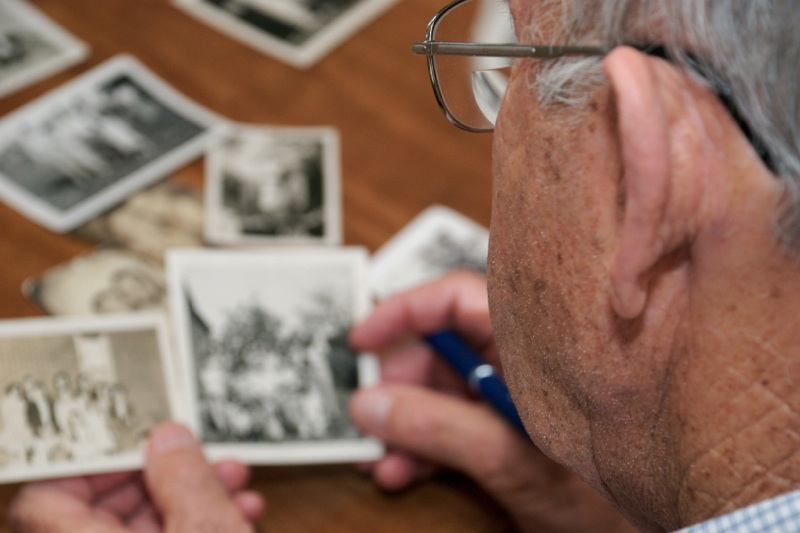I have recently been thinking quite a lot about the past. I guess that’s what a lot of people do as they grow older. I find myself not only turning over events in my own life (as far as I can remember them) but also increasingly drawn to reading all kinds of history books.
We are frequently urged to try to stay fully present in the “here and now.” This is certainly fundamental to many kinds of beneficial practices, but I wonder whether the emphasis on the present moment can’t sometimes be taken too far. Recently when googling various Buddhist and mindfulness related topics, I came across many web pages with headings such as “Stay in the Present”, “Enjoy the Now”, “How to Live in the Present”, and “Present Moment, Only Moment.” I’m sure that some of these pages contain some very useful advice. However, the impression sometimes seems to be given that “living in the present” is the be-all and end-of-all of Buddhist practice.
Clearly, if we are trying to be mindful of bodily sensations, or the arising and passing away of feelings, emotions and thoughts, or if we are trying to develop unwavering concentration on a meditation object, we don’t want to be caught up in regretful thoughts about the past or worries about the future. However, this doesn’t mean that there are not also times when it is useful and important to be mindful of the past and to contemplate possible futures. A person who really did spend most of their time living in the present without any sense of how the present moment came to be or of the possible futures effects of their present actions would, it seems to me, be living a very shallow life.
I find it useful to sometimes remember what I was like, what I did and what happened to me at various time in the past, even though I realise that the narratives my mind tells may often be far from “photographic” records of the actual events. Apart from anything else, thinking about my past makes me aware of how I have changed and how different in many ways I now am from the person I once was, yet at the same time how some habitual patterns have continually repeated themselves. It also makes me aware of the contingency of my present situation – how differently things could have turned out with just some tweaking of the causes and conditions.
I can’t remember which teacher it was who recommended the practice of going through your life roughly one decade at a time and bringing to mind all the people who have helped you – parents, teachers, good friends – expressing gratitude to them, and rejoicing that such people exist. When I first did this, I was surprised at the number of people I had to thank. This practice is a good antidote for envy and self-pity (not that I can claim to be entirely free of such emotions) and also a good basis for developing sympathetic joy in other people’s successes and happiness.
I also think there is great value in learning about and reflecting on history. In my case, it has made me aware of how fortunate I was to be born in the UK right in the middle of the 20th Century. As a child, I was not carried off or crippled by any of the childhood diseases endemic until the development of vaccinations and good sanitation, as I grew up I received free education all the way up to university level, as well as free health care. Such advantages were unknown to previous generations of my family and of my social class, and indeed are no longer available to many young people today, even in relatively prosperous parts of the world.
As an adult, I have never had long periods of unemployment and I have never been drafted to fight in a war, had bombs dropped on me or been affected by famine or plague. I have also never been imprisoned or persecuted for my beliefs, ethnicity or sexuality. Today I’m sitting comfortably at home, tapping away on my computer. If it gets too dark, too cold or too hot, I can just flip a switch to get light, heating or air-conditioning.
Whatever role karma may have played, I certainly cannot take personal credit for all this good fortune. I have benefited from the efforts of generations of scientists, engineers, social reformers, politicians (yes, politicians have at times achieved great and beneficial things) and others. It must be admitted that I have also benefitted indirectly from the suffering of large numbers of people across the world whose exploitation and enslavement contributed to the creation of Britain’s prosperity.
Of course, like anyone else, I have had my share of suffering and no doubt there is more suffering to come for me, but anyone who knows their history will realize how rare if not unprecedented it has been for humans to be able to live lives of such relative comfort, security and opportunity. They will also realize how fragile it could all prove to be. Like all other phenomena, civilizations are impermanent and will fall, or evolve into something very different. Many feel that the cracks in our civilization are already showing. Certainly, the easy assumption of continual progress we all seemed to have when I was young is a delusion.
So I am not too worried about my increasing tendency to think about the past and to bury myself in history books. So long as such activities don’t end up just being an escape from confronting the present, they can actually help deepen my understanding and appreciation of the here and now.

